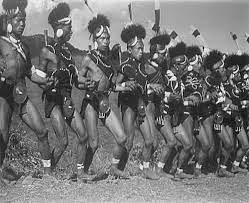This account of Chingmei warriors dance on 11th November 1947 is extracted from Mildred Archer’s Diary.
When the salaams were finished and rum and red cloth had been given to the headmen, the crowd formed a great circle. Men climbed trees, babies were mounted on their fathers’ shoulders and there was a sudden hush as a hundred warriors came dashing into the ring. It was a dazzling sight; brass plates glittered in the sun, hornbill feathers, scarlet plumes and black tresses of hair tossed against the blue sky. It was a riot of black, white and scarlet and shining lithe brown bodies. At first there was a stampede of thumping shields, clashing daos and plates, then gradually the warriors formed a line and moved slowly round posturing in slow-motion warlike attitudes.
The parade over, shields and spears were put aside, all joined hands in a line and the dancing started. The first was the dance done when setting out on a raid. Then followed the crow dance and the wagtail dance. There was another where a great warrior with a companion ramps up and down inside the circle reciting his deeds in a loud voice, and shaking his spear, his friends behind testifying to them.
These Naga dances are by no means as thrilling, or beautiful as those of many Indian tribes; there are no throbbing drums or elaborate movements. They are repetitive and monotonous with a barbaric jerkiness. But they move with a wild vitality, cat-like spring and jigging movement, which combined with the varied singing conveys excitement and elation. There is a great range of sound as in Negro spirituals; the voices are sometimes a deep soft bass alternating with each other like the responses of some wild litany, sometimes a high shrill feminine note interspersed with quavering catcalls and yodelling cries. They remind one of the devils and sprites in a pantomime. But the chief beauty of Naga dances lies in the brilliant spectacle and the ballet-like clothes. As I watched I felt sad and depressed for this is the swan song of a culture which will surely die. The opening of the new subdivision will be the first step in killing this way of life for without headtaking the warrior will have no further function.
The dancing continued all the morning. It was a thirsty business and friends of the dancers went round with tankards of rice beer and bamboo straws. They would hold them up to the dancers and then move with them for a short way so that the dance need not be interrupted.
Courtesy: Longshim.com







